My kid is in social skills class. Is yours?
Neurospicy kids shouldn't be the only ones forced to understand inclusion 🌶️
Welp, it’s June. Which means my 7-year-old daughter is starting her summer full of day camps. She’ll be attending a mix of them; some are more creative, some are more outdoorsy, while others are more STEM-specific. Honestly, I’m jealous; I wish I could spend my summer days doing improv, playing with Legos, and jumping on trampolines.
Last year was our first foray into summer camps and it was tough. Both for her, as a neurospicy kid in new spaces with new rules/people. And for me, as her parent who’d get phone calls about how she had a “hard day” and would then see firsthand how exhausted and alone she was at pick-up.
At the end of last summer, we learned that Abigail is “Twice Exceptional” (sometimes written as 2e).1 This means she is both exceptionally bright in some areas and exceptionally weak in others. I won’t get into specifics, but her intelligence (and charming personality IMO) mask her disability pretty well, so she doesn’t appear at first glance to need much extra support. But she does sometimes.
Abigail is a passionate, curious, creative 7-year-old. She loves acting and art, science and swimming. Fashion (see above). Carly Rae Jepsen. Girl Scouts. She’s a sweet, sensitive big sister and loves being a leader. She picks out her own outfits, helps with chores, and is an overall social, silly kid. But she’s also stubborn. Quick to anger. Infuriated by any type of perceived injustice. Loud. Chatty. Impulsive. Easily upset by other kids being too rowdy and/or not following the rules…which makes her tough to collaborate and play with sometimes.
But here’s what kills me: Abigail tries really hard, day in and day out, to learn and apply social rules so she can better engage with her neurotypical peers. She’s in a social skills class through her elementary school. She’s in play therapy. Last year she was in occupational therapy. She is trying so hard to adapt so she can better fit in with neurotypical norms.
Usually without much reciprocity.
The neurotypical kids she is surrounded by are not expected to learn, acknowledge, or help with any of this. Meanwhile, she is constantly expected to push herself, mask, and flex to meet them where they’re at. The whole dynamic makes my stomach flip (and honestly makes me want to flip a table) because, really: Why aren’t we also teaching neurotypical kids how to stretch toward inclusivity? Why aren’t all kids in social skills class?
If you have a neurodivergent kid, you get it.
If you have a neurotypical kid, hear me out. This dynamic is real and it affects your kid just as much as it affects mine.
It’s always “different” kids who are expected to adapt
Abigail’s social challenges aren’t an isolated story; they reflect a much larger pattern.
But first, we have to agree on one key point: There is no singular, correct way to exist as a human being. There are a billion different ways to think, behave, exist, and operate2. We NEED diverse brains the same way we need diverse bodies and religions and talents and skills and personalities. The richness and success of our world depends on this.
That said, our society (capitalist/consumerist/patriarchal/productivity-obsessed) very clearly rewards a certain “way” of existing and behaving. And not everyone fits into that mold. I wish we could all be more OK with this, instead of trying to morph and self-improve into a socially-acceptable, more palatable paradigm.
Like Abigail, many neurodivergent kids are actively learning how to adapt to environments that were simply not designed for them. They are in therapy, OT, social skills classes, etc. to try and learn how to form friendships and sometimes just exist peacefully in the world.
Meanwhile neurotypical kids are rarely taught how to recognize or include kids who behave differently. They’re told other kids are “being bad” for kicking sand, having a bathroom accident, or screaming and covering their ears during a loud music class. The message this sends to everyone is that the problem is always the neurodivergent kid. They’re being too too disruptive, too weird, or just “too much.”
And the research (depressingly) backs this up:
50–70% of kids with ADHD are rejected by close peers by second grade (Hoza et al., 2005).
They’re more likely to be actively disliked than simply ignored.
Their friendships are often more unstable, shorter-lived, and more conflictual than their neurotypical peers’ (Bagwell et al., 2001).
This isn’t just unfair, it’s a loss for everyone. Because…
Inclusion isn’t charity
It’s not just better for my kid to feel understood — it’s better for YOUR kid, too.
Kids who learn to engage with different types of kids early are more adaptable, compassionate, and emotionally secure. Inclusion builds empathy, curiosity, leadership, and emotional intelligence in neurotypical kids.
And also…my kid doesn’t just have a disability or something she needs to “overcome.” She’s not wrong or weird. She has SO MUCH to offer the world and her relationships. She’s creative. She’s brilliant. She picks up on details and notices common threads disturbingly quickly. And most of the time she’s RIGHT about the patterns, actions, and discrepancies she notices.

Neurodivergent people often see the world in wildly creative and powerful ways; whether it’s spotting patterns neurotypical people miss, thinking outside the box, or offering a fresh view on friendships, fairness, and problem-solving. It’s a gift to share, not a problem to solve.
Most of my favorite humans are neurodivergent; they are passionate and funny and make the coolest, most creative observations. Sure, sometimes I want to wring their necks when they forget my birthday or interrupt me ad nauseam…but also they’re not wrong/bad. And I’m not right/better. (Hey Becca, feel free to screenshot this and text it to me whenever needed).
Relationships and friendships require two people meeting in the middle so we can each get what we need/want. It shouldn’t all be on the neurodivergent person to figure out or adapt. There is no one right way for a mind, body, or person to be. I wonder what would happen if we stopped expecting kids to fit in and started seeing them for who they are?
So what can you do?
🤝 Model Curiosity, Not Judgment
Normalize the idea that not all kids behave the same way; and that’s not scary or bad. They’re not wrong or weird. They do things differently. It’s not just ok. It’s a gift. How boring would the world be otherwise?
Don’t label other kids as “weird” or “bad” in front of your kids (even subtly…like with an eye roll). Kids are very perceptive and they know when you’re judging someone. Try saying things like: “Looks like they’re playing a different way. I wonder what their idea is.”
🧠 Teach Friendship as a Skill
Notice and discuss when someone is being left out. Why are they being left out? How does your kid think it makes them feel?
Practice ways to include someone who might not join a game in the “usual” way.
Offer concrete scripts or phrases: “Do you want to play with us?” or “What game do you want to play?” or even ways to negotiate play.
📚 Read Books & Watch Shows with Inclusive Characters
Expose your child—and yourself—to stories where neurodivergent kids are central, not sidelined.
Here are a few of my favorites:
The Dory Fantasmagory series by Abby Hanlon. Abigail and I LOVE these books and laugh our way through them. Dory is definitely “different” and it’s a fun jumping off point for lots of conversations.
The Ramona Quimby Series by Beverly Cleary (mostly) holds up and it’s fun to get to know her again, now as a parent
Daniel Tiger speaks to inclusivity a LOT and very well (and also has a frequently featured character with ASD named Max)
Sesame Street introduced Julia, a character with ASD, back in 2017 and she is frequently featured.
For adults, if you want to learn more about 2E kids specifically, check out my favorite leader in the space, Dr. Danika Maddocks.
I also have been loving The Pitt and all the work it’s been doing to highlight neurodivergent characters in honest, loving ways—like Dr. Mel.
For adults, check out Love on the Spectrum on Netflix. It does a great job of showcasing many beautiful ways folks with ASD think and how their diversity makes the world better.
This requires work.
It’s a big ask. I get it.
Maybe you’re the parent of neurotypical kids and you’ve hate-read this whole essay, like, “I have enough on my plate, lady! Why should my normal kid be burdened by the extra work it takes to include, understand, or affirm your neurospicy kid?”
Maybe you’re old-school like Brad and think that neurodivergent kids NEED to learn how to mask so they will grow into functional, respected adults.
Maybe you’re neurodivergent too and YOU had to learn how to mask and repress to be accepted and you think that helped you in the long-run (or you think, ‘Well, I had to learn how to change my whole-ass personality so kids need to learn that, too!’ which…ok that’s giving MAGA but you do you, I guess).
Maybe you worry it’s harmful for us to be gentle, compassionate, and inclusive because then our neurospicy kids will incorrectly expect accommodations from the rest of the world…to which I say….
Neurodivergent kids will have NO SHORTAGE of experience being excluded and side-eyed and talked shit on throughout their lives in every single capacity. The world will tell them every day that they are weird and too much and too sensitive. They don’t need it from their own family/friends/teachers/classmates at 7.
I understand that the world as a whole is not going to care about Abigail’s accommodations. It will fall on her as she gets older to articulate and advocate for her needs. Which is why it’s important for me to help her notice, recognize, articulate and advocate for her needs NOW. She understands her diagnosis. We talk about how her brain works. And she is learning how to notice the signs in her body when she’s overwhelmed and needs a break. My goal is to create a brave, strong, self-aware person who doesn’t feel ashamed to ask for what she needs, whether it’s more time on a test or a better chair at her office job (if there are still office jobs in 20 years).
I’m also hopeful that she’ll find the right schools, clubs, friend groups and employers who WILL care, get it, and not feel threatened by her differences.
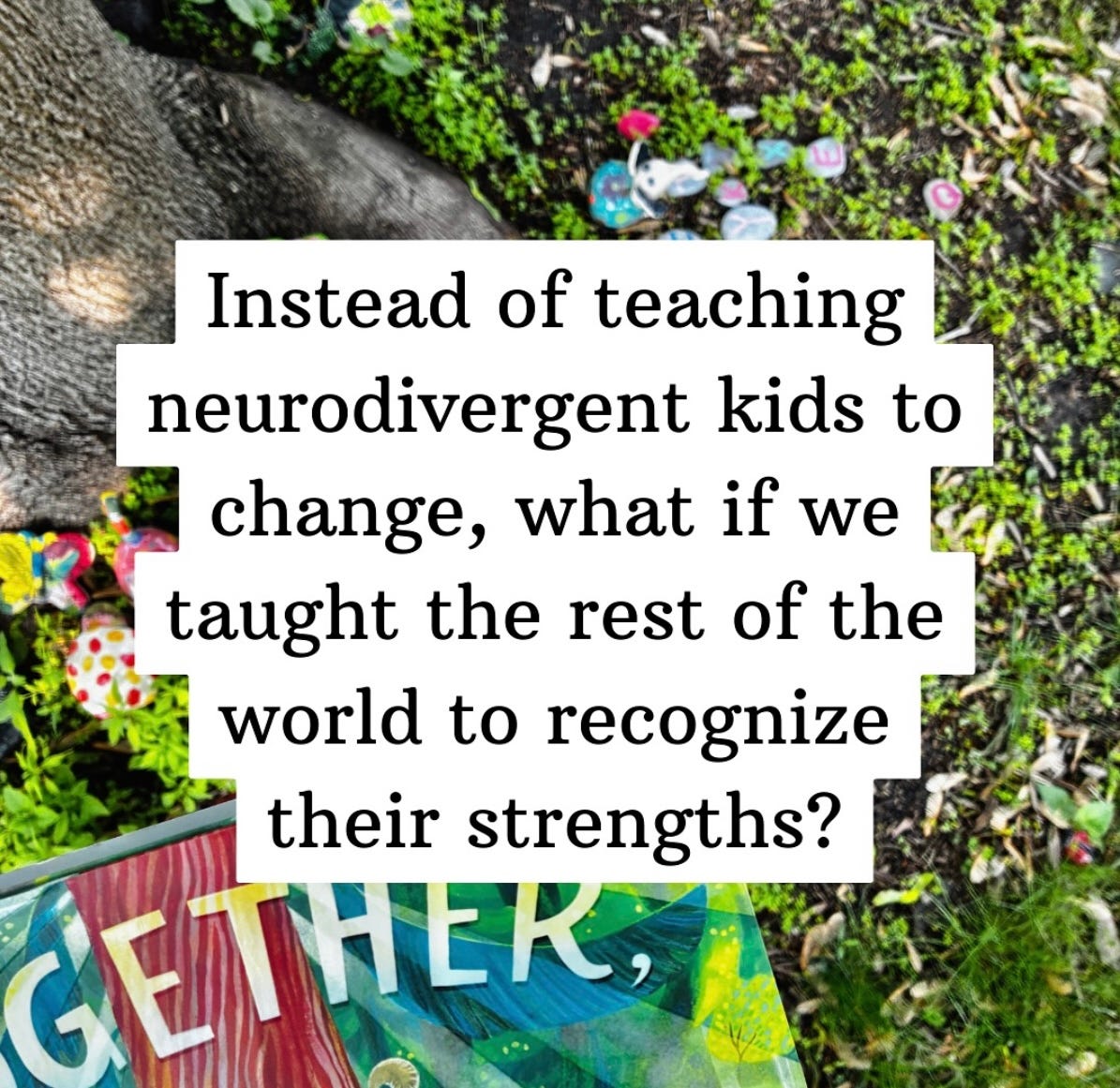
I’m not opposed to Abigail taking social skills classes. Hell, she is teaching me tons of stuff.
The other day, Pippa (her 3.5 year old younger sister) was throwing a fit and I muttered under my breath, “She is SO stubborn,” and Abigail gently corrected me. She said, “She’s not stubborn, Mom. She’s just having stuck thinking.”
Ok, Mel Robbins, thanks for the reframe. (Can we also just agree that schools are getting WAY better at teaching this kind of stuff in general?)
But it shouldn’t be on Abigail to teach me or her peers. She shouldn’t be the only one who has to adapt and learn how to befriend and engage with people who think and act differently than she does.
When we stop forcing children into one-size-fits-all molds and truly honor their unique minds and bodies, we open the door to their fullest potential and deepest joy.
How might we recognize each other’s differences in ability, skill, interest, and personality-type and honor our shared humanity?
Talk to your kids. Model curiosity and compassion. Celebrate their friends’ differences. Push back against a world that says there’s only one way to be.
2e is shorthand for Twice Exceptional. From ChildMind: “Some children are highly gifted in areas such as math, writing or music. Then there are those with challenges that affect learning: They could have ADHD, dyslexia or dyscalculia, or perhaps they’re autistic or have sensory processing issues. But there are also kids who fit both categories. They’re called twice-exceptional, or 2e, which means that they have exceptional ability and disability. They are gifted in some way but they also face learning or developmental challenges.”
This sounds like a huge “duh” but I think we often forget this. For example, in our society we’re programmed to equate lateness with being rude (versus someone struggling with time management and executive functioning) - yet in many countries (like Brazil), being on-time is way less important than it is in the U.S. It’s not a moral failing. It’s a cultural difference. Anyway, moving on…

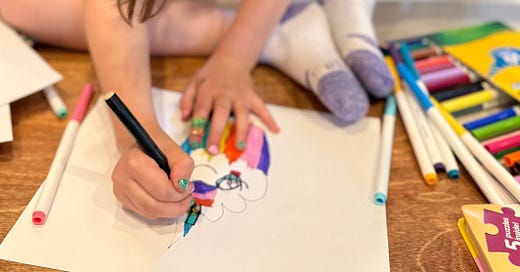


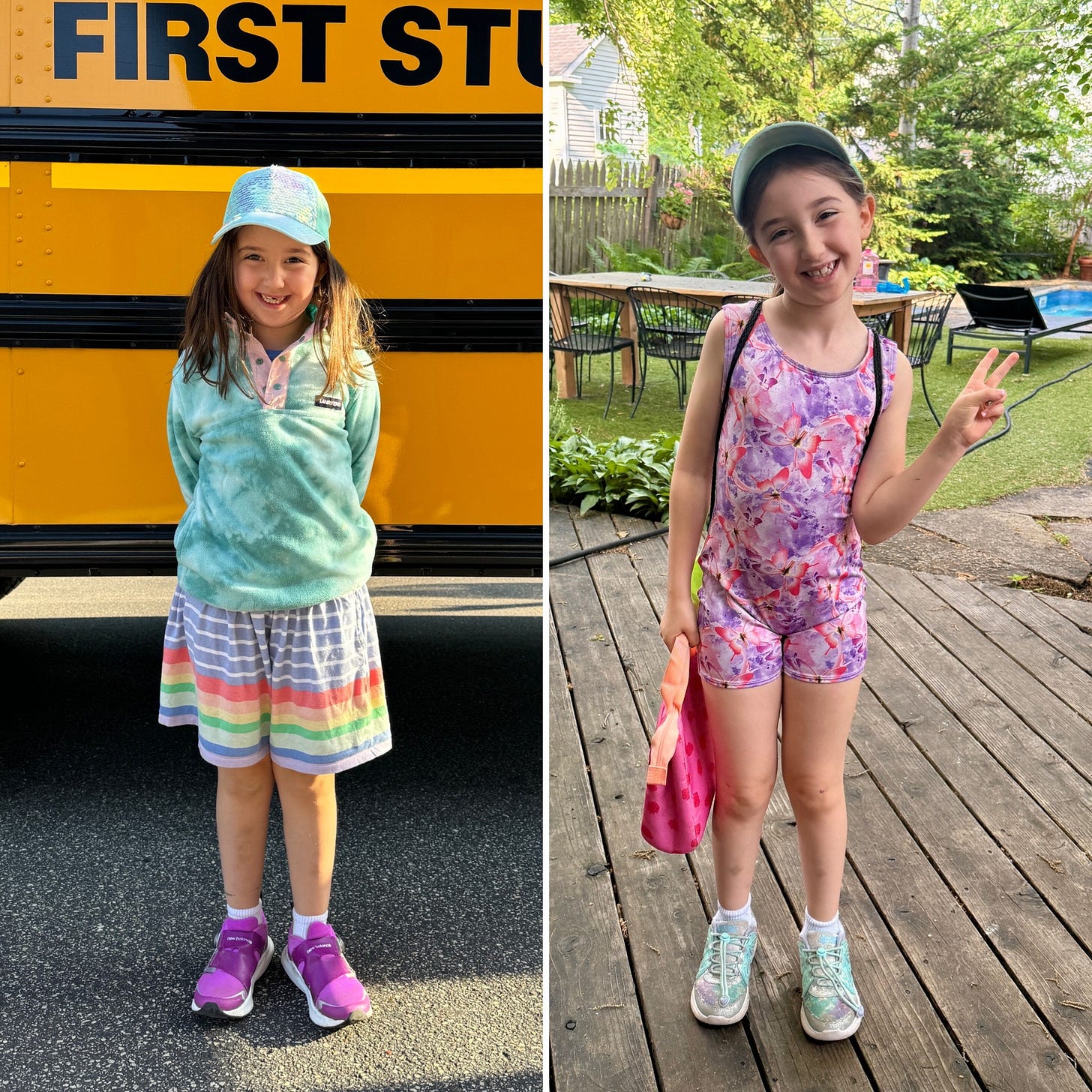
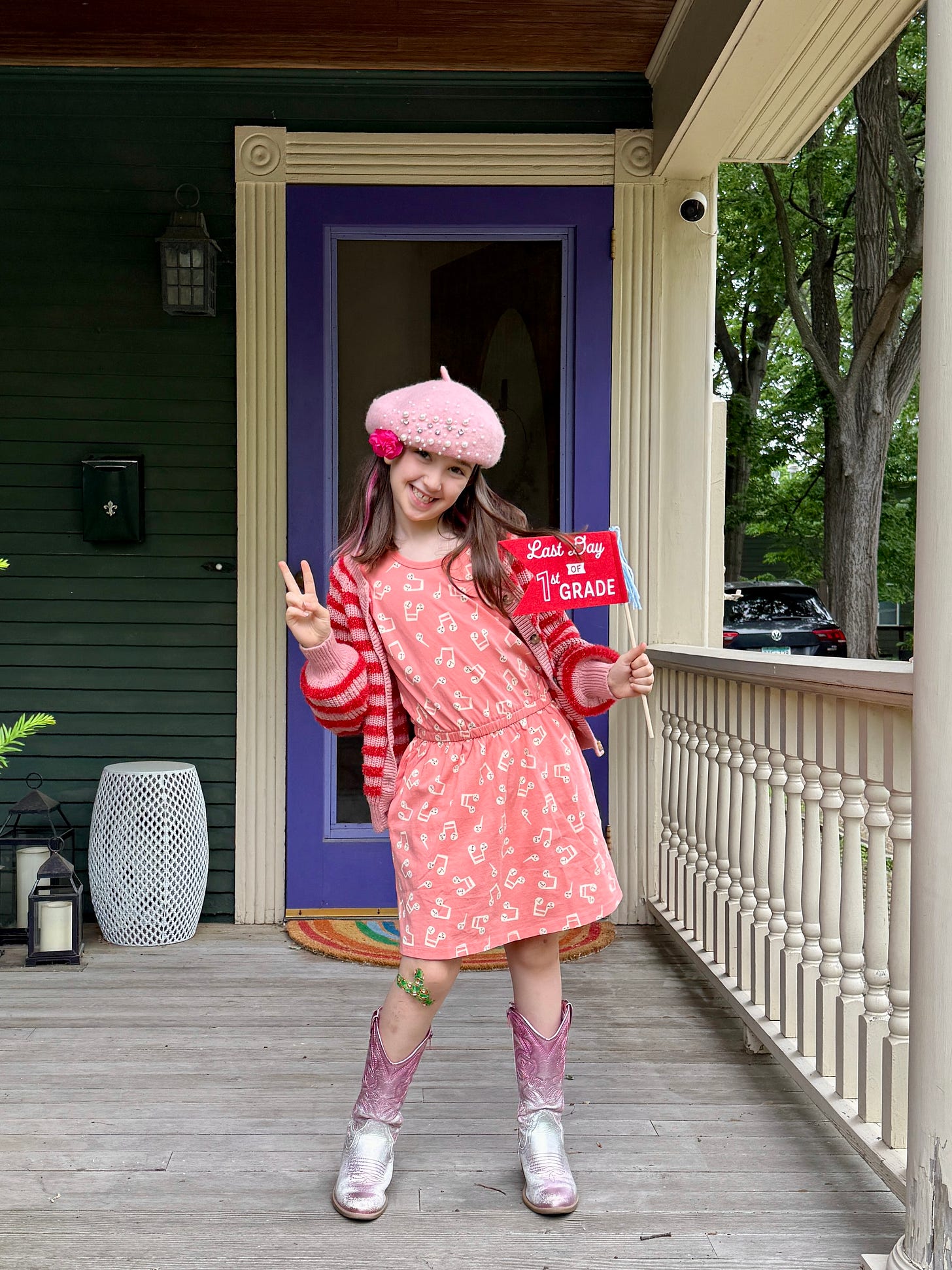

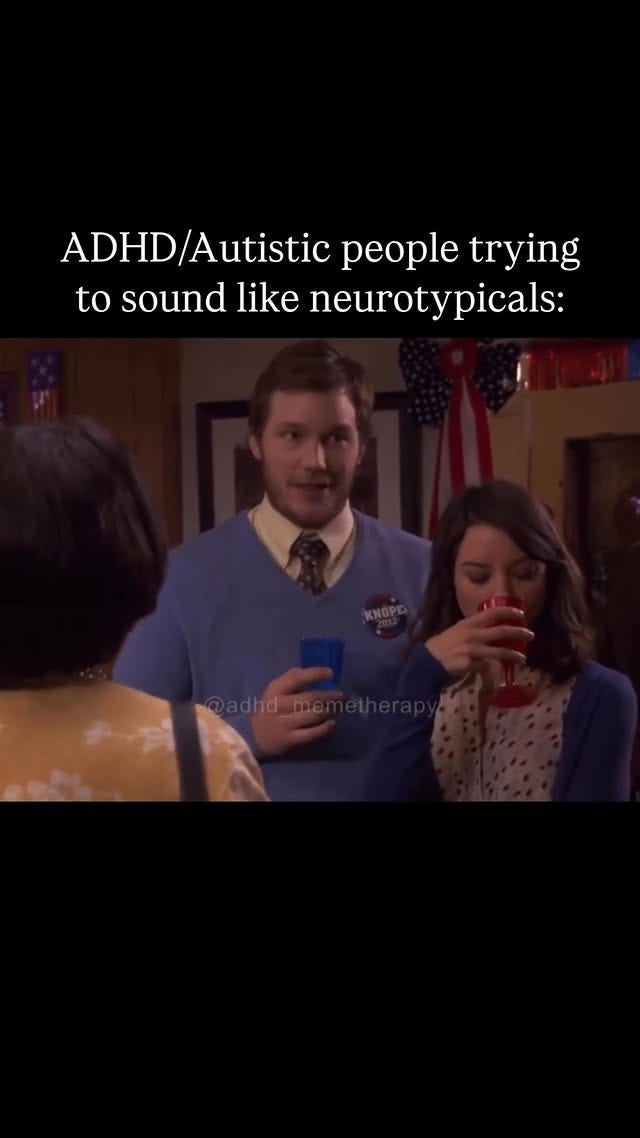

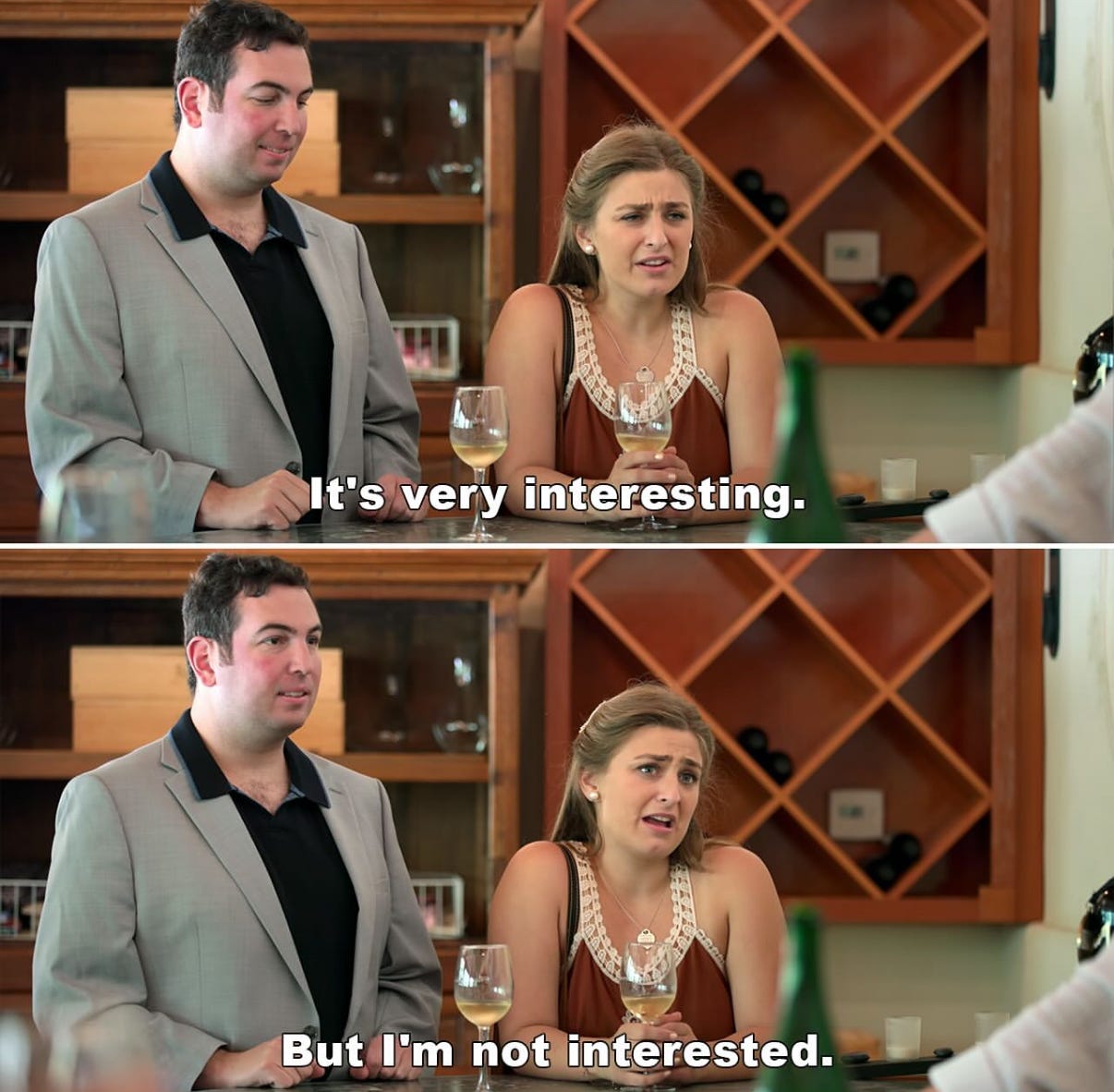
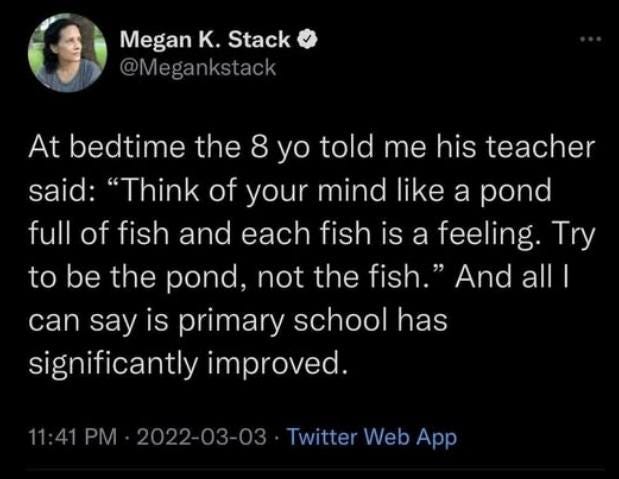
I have been trying to teach Aily about inclusion and how different kids learn differently. I am hoping with a whole lot of reinforcement and modeling she will be an ally to her friends like Abby. You’re such a great mom, Elyse. She’s so lucky to have you!
As the parent of two pretty neurotypical kiddos, I found myself feeling jealous of the social skills classes Abby is taking! Just tonight, I was trying to get Leo to practice reading and he was losing his mind. Once he calmed down and took some deep breaths, the reading came easy. Oh, how we could all benefit from what I imagine she is learning… including plenty of neurotypical adults I know.